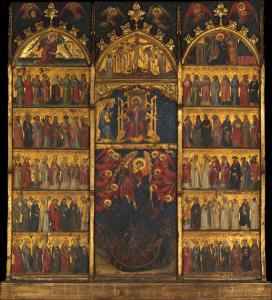
Some Christians are so focused on theological speculations and otherworldly contemplations that they do not properly live out their lives. They think Christianity, Christian existence, is all about forming the best ideas, ignoring that they are to live out those ideas and not just sit around thinking about them. Christ, after all, was very active in his ministry. He did not just sit around in contemplation, nor did he go around seeking theological debates. He was interested in being with people, showing them his love, doing what he could to help them. This is how he revealed the truth of God. It was because he put his love into action they were willing to listen to him, to hear him speak of the great mysteries, and believe. This is not to say theological reflections are worthless. Finding the best way to proclaim the teachings of the faith is important, because when people have questions, it is worthwhile to be able to give them the best answers possible, however, we need to realize we need to more than proclaim the faith through words, we need to live it out, revealing the truth of it through our lives and not just through our words.
This is why we should not be like the Gnostics, for they were unconcerned about the world and what happened within it. They believe d that the world, and all material being within it, was evil and should be rejected. This is far from the Christian message, for Christianity teaches that God so loved the world that the second person of the Trinity, the Logos, assumed human nature and became a part of it. Thus, Jesus did not avoid the world and the people within it; rather, he entered into the world to show those within it his love, meeting people where they were at so that they could hear the good news which he had to offer. And what was that news? God loved them and sought them out to save them. He encouraged everyone to follow engage that love for themselves so that they could and would be transformed by it. He gave them the grace they needed to actualize their potential, and beyond that, to transcend themselves and experience the glories of eternal life. Jesus mourned the death of Lazarus, showing us that we are not to take death lightly.
We not only have the example of Jesus, we also have the example of various holy men and women who, through their love and devotion to God, show us various ways one can live out their life for Christ. Indeed, it is important we look at them and reflect on what they did, for in doing so, we will be motivated to do more than treat the faith as some philosophical exercise, but understand that it reveals to us the truth of reality so that we can properly live out our lives. “For the virtuous life and habitual piety do not merely consist of studying divinity; not only of thinking on an elevated plain about things as they are here and now. It must also include the description in writing of the way of life of others.” [1] This is not to say we are to imitate everything those who came before us did, because, even if they lived holy lives, they still did many things poorly, and so throughout their lives they made many mistakes, sometimes disastrous ones. We all have our own faults, many of which we do not recognize as such, which is why it might take sometimes several centuries later, looking at our lives in hindsight, for those faults to be properly revealed and understood as faults. Thus, though those who came before us often did things which we can now see as not only being a minor fault, but a grave wrong which we should fix, we can still look up to them for the good which they did and learn from them so as not to make the same mistakes they did. Then, when we realize how those who came before us, even some of the holiest men and women, could and often did so much which was wrong, we should realize we are likely to do so as well. This should not lead us to despair. Rather, it means we should be humble, recognizing our weaknesses, and in this way, we will look up to God to perfect us with grace instead of pridefully thinking we can do it all ourselves.
Dorothy Day was concerned with the way so many treated the faith, acting as if all they had to do was believe the right things about God and God will take care of everything else. This is what happens when people think the faith is about what we know instead of living faithfully to the truth which God has revealed to us. That is, so many hold to such an unworldly notion of faith that they ignore the expectations of the faith itself. God will take care of us, but God also wants us to do our part. We should not put God to the test. Thus, in a letter, she explained: “I have said over and over again that Catholics have more faith in God than they have in man and that is the trouble with religion. It is transferring our hopes from earth to heaven and from man to God to such an extent that we turn to pie in the sky and forget that we are all members of the Mystical Body of Christ right here on this earth.” [2] If we looked to the lives of the saints, we would learn that the holy life is a life lived, not just a life of theological reflection and contemplation; the truth is meant to be lived out, to be something seen and experienced in the world itself. Proper theological reflection, proper contemplation on Scripture, is not had unless we live it out:
Meditation on the law does not consist in reading, but in doing as the Apostle says in another place: ‘Whether you eat or drink, or do anything else, do all for the glory of God.’ Even if I merely stretch forth my hand in almsgiving, I am mediating on the law of God; if I visit the sick my feet are meditating on the law of God; if I do what is prescribed, I am praying with my whole body what others are praying with their lips.[3]
This, of course, is one of the lessons we learn when we read of the lives of those holy men and women who came before us. They strove to live out the faith, to continue the work of the incarnation through what they did. By reading about their lives and what they did, we see that revelation itself is meant to be interactive; the more we engage it through our actions, the more we will find ourselves transformed by it, and the more we find ourselves transformed by it, the more we will understand it and be able to better interact with it and its expectations. Thus, those who want to know and understand the truth of the faith better will find that they will do so more through the way they live it out than they do through scholarly studies and memorizing fine propositions based upon the teachings of the Gospel.
[1] St. John Moschos, The Spiritual Meadow. Trans. Jon Wortley (Collegeville, MN: Cistercian Publications, 1992; repr. 2008), 3.
[2] Dorothy Day, “Letter to the Buffalo Catholic Worker. 1940,” in All The Way To Heaven: The Selected Letters of Dorothy Day. Ed. Robert Ellsberg (New York: Image Books, 2010), 156.
[3] St. Jerome, The Homilies of Saint Jerome: Volume I (1-59 On the Psalms). Trans. Marie Liguori Ewald, IHM (Washington, DC: CUA Press, 1963), 6 [Homily 1].
Stay in touch! Like A Little Bit of Nothing on Facebook.
If you liked what you read, please consider sharing it with your friends and family!












